In one small Georgia town, everyone knew the president
Published in News & Features
PLAINS, Ga. — They quieted their dogs when he jogged by their homes. They saw him getting ice cream. Or paying respects at graveside services. Or popping in for a fried catfish dinner. Or pitching against them in a softball game. Or stopping by to welcome them to the community. Or riding by on bicycles with his wife.
All very normal and neighborly. Well, except maybe for the Secret Service detail quietly tailing him.
Plains, Georgia doesn’t have a big grocery store, robust dining options or a movie theater. But, until just days ago, it has had a former leader of the free world.
And the fewer than 600 people who live in the small southwest Georgia community had plenty of chances to see him up close. Sometimes, very close. Like on the same couch. Because Plains is a rural town where almost everyone knew a U.S. president, Jimmy Carter.
They also knew a first lady, Rosalynn Carter, Jimmy Carter’s wife of 77 years, who also grew up in Plains, and died here in November of 2023. Jimmy Carter died Sunday, nearly two years after entering home hospice care here.
That’s not to say they were all close friends with the former president. Many locals, interviewed in early 2023, said that over the years they saw him every once in a while, often in passing. Sometimes they would exchange friendly greetings and maybe quick chit chat. “Beautiful yard,” he might say. “Thank you, Mr. President,” they’d reply or maybe “Thank you, Mr. Jimmy.”
The casualness of the relationships might say something about the kind of place that Plains is, the kind of person Jimmy Carter was and the draw of home. He grew up around Plains, followed ambition to travel far afield, then returned decades ago. Eventually he drew his last breath in hospice here, in the house he and Rosalynn built in 1961.
At 100 years old, Carter outlived many of his hometown peers. Often, those who saw him in Plains are the kids, grandkids and great-grandkids of people he grew up with.
But they knew him. He was their boy scout troop leader or Sunday school teacher. He called to congratulate locals who won public office, to offer prayers after a tragedy, to tell people their projects would be receiving support form his foundation, such as for paving a dirt driveway through a local church cemetery. He showed up for local business grand openings and announced contest winners at the peanut festival.
Sometimes, “Mr. Jimmy” and “Mrs. Carter,” who died at the age of 96, would stroll just around the corner from their house and by the yard of Terretha Burns, a line worker at a local processing business, where she cooked peanuts in hot grease. The former president would compliment her yard’s landscaping, from the peach and plum trees she transplanted there to the big tractor tires she painted white and stationed on the ground.
“I felt good,” Burns said in 2023.
Burns was one of many Plains residents interviewed in the days after Jimmy Carter entered home hospice care. Here are some of the stories they shared.
On the couch with Jimmy
Having Jimmy and Rosalynn Carter knock on the door of his childhood home every so often was exciting, but seemed kind of natural, as Montavius Bridges remembered it.
They’d bring turkeys and hams around Thanksgiving and Christmas to neighbors in need living in public housing in Plains. And on weekends once a month they’d show up very early in the morning, knocking on doors to drop off food boxes, Bridges recalled.
“They were the alarm clock on Saturday morning. People got used to it. People started getting up early.”
Bridges, who now has “Plains GA” tattooed on the back of one hand, said he’d talk with the former president, mostly when Bridges was a child. About what, he couldn’t quite recall. “It was just a normal conversation.”
He’d see the couple at the local boys and girls club, a short walk from the Carters’ home, or out riding beach cruiser bicycles through town. He said he saw the former commander in chief riding an electric scooter into town with Rosalynn, maybe a nurse and his security detail following along.
Back in the day, he and other neighborhood kids would be picked up in a van to go to vacation bible school at Maranatha Baptist Church, where Carter would give some of the lessons, he said. “The kids just loved to be there with Jimmy Carter.”
On one of her food delivery visits to the Bridges’ home, Rosalynn Carter was smitten by how cute Montavius’ niece was. A’Moni was maybe a year or two old at the time, said Tae Bridges, the girl’s mother. “Ms. Rosalynn was obsessed with her. She caught Ms. Rosalynn’s eye.”
The family likes retelling how Jimmy Carter later showed up at the home, saying his wife had insisted he come by to see the adorable child. They treasure a picture of him sitting on the couch with them.
Tae Bridges said she had tried to explain to her daughter that Carter might pass away soon. She wasn’t sure her daughter really understood. It felt like the Carters had been a part of their lives all along.
“He wasn’t a stranger to us. He was like a family,” said the mom, then a clerk at the local Dollar General. Tourists who come into the store often asked if she’s ever seen the former president. She would say yes, but sometimes they looked at her like they didn’t believe her.
“He’s a very kind-hearted person,” she said back then. “He doesn’t treat us any different. He treats us like family.”
Competing with a president
Larry Williams remembered when he was about 10 or 11, Carter was his Sunday school teacher at Plains Baptist Church. Local kids didn’t cut up in church much back then, so the president-to-be didn’t have to scold much, he said. “He was good. He told you what you needed to learn.”
Before Carter was president or even governor, locals saw him everywhere, as another person in the peanut processing business, Williams said. “My family was his competition. They bought peanuts; we bought peanuts. We did the same thing.” But “we got along fine.”
When Williams got married, Carter, then governor, sent the couple a bronze ashtray with a wedding seal on it as a wedding present. Townspeople got used to Carter’s changing roles as he moved up the political ladder.
The last day of the community’s annual peanut festival usually included a softball game, with the then-president on one team, as pitcher. Williams was usually on the other, often covering third base. “A lot of times he’d get on (base),” Williams recalled. “I might have thrown him out once or twice.” When Williams was at bat against the president’s pitches, “I got on sometimes. Sometimes I didn’t.”
Biking with the Carters
When the former president jogged or bicycled by Clara Thomas’ trailer home out in the country about 30 years ago, kids in the family would shush the barking dogs.
Thomas would watch him pass by from the porch on her home at the time on Carter Fish Pond Road. Sometimes Carter would stop and say hi. Sometimes the children would run up to him on the road and, for a while, tag along with him on their bicycles, with the Secret Service agents close by.
Her son, Patrick Thomas, who became an electrician, remembered talking to Carter as a kid. “He was still in good condition then,” running maybe four or five miles from his own home. And he’s got pictures of his daughter, Passion, and other family members with the former president.
Carter gave off a positive vibe, the younger Thomas said. “He was really nice. Always kept smiling on his face. Everything he said was encouraging.”
Over the years, they’d sometimes see him elsewhere, such as at a community gathering that included a meal. Patrick Thomas’ young daughter at the time asked Carter if he was going to say grace before they ate. He smiled. Yes, he said, and he did.
Helping the president after hunting
Micah Money, a utilities worker for the city of Plains, said he had been around the former president in lots of ways since he was a kid.
Money helped operate cameras to capture Carter’s Sunday school lessons at Maranatha. He worked on local Habitat for Humanity house building projects with him.
“He always taught me to just keep it real and work hard,” Money said. “If you have a good work ethic, your work will speak for itself.” He remembers Carter giving interviews to TV reporters during the home building, but the former president was anxious to get back to the construction work.
Carter and his Secret Service team would park in Money’s family’s front yard out in the country, because it was the quickest way to the former president’s hunting land on four wheelers. Some of the federal agents would remain in the front yard while others went out with Carter into the woods. Money and his family would invite them all into their home to warm up with coffee. And Money would quickly process whatever deer or other game Carter emerged with.
“He often asked me how I worked my knives so well,” Money said. He was 12 at the time.
And there was the time when Money and a team that included two of his siblings went to Oklahoma for a national 4H contest and placed third in the land judging category. After the youth arrived back in Plains, Carter was at the local city park to congratulate them. “I remember how special it felt.”
He was gracious ... usually
Locals’ interactions with the Carters inevitably centered around the graciousness and kindness of the couple, said Philip Kurland.
Kurland had the same experiences. Usually. He described Rosalynn Carter as “a very sweet and kind woman” who would give him small gifts of items for his political memorabilia shop in Plains.. Jimmy Carter would sometimes stop by and talk politics, but he lost interest if Kurland wasn’t knowledgeable on the particulars of the topic. “If he saw I was off base, he would just leave,” Kurland said.
And then there were the two times in the last 30 years when the former president berated him. Carter didn’t like the idea of Kurland selling his autographs, but often he still would sign things for the shopkeeper, sometimes eliciting a promise for a donation to a nonprofit. One day, Kurland saw Carter at the post office and asked him for two signatures. “In front of everyone, he starts yelling at me. ‘I’m not signing...’”
“I’m turning red. I’m so embarrassed. Rosalynn rolls her eyes at him. Five minutes later he comes in and grabs them out of my hand and signs them.”
Another time, Carter grew angry when Kurland asked for signatures with Carter’s middle name included. “For a couple minutes he just let off at me,” Kurland said. “To this day I don’t know what the big deal is about signing his middle name.”
‘One of the first people at the house’
“Hey, President Carter,” Bailey James would call out when she’d pass the Carters around town as a teenager.
She said didn’t fully realize how such interactions would be viewed by outsiders. “When you grow up here, you don’t really appreciate it,” said James, a 20-something who moved closer to metro Atlanta, though she returned often to Plains.
Then, several years ago, she and her mom and dad finally attended a Sunday school class being taught by Carter at Maranatha Baptist Church. She remembered how people from other countries had trekked to South Georgia to hear Carter, the same kindly man who had presented her with an art award at the peanut festival when she was in third grade.
Carter was often a witness to — and, sometimes, participant in — the arc of the lives of people in Plains. About six years ago he was at the grand opening of the flower and gift shop that James’ mom launched in town. Rosalynn later visited and commented on the lovely orchids.
James’ grandmother, Cheryle McCrary, remembered the former president and his wife coming to her own parents’ 50th wedding anniversary. Later, McCrary said, “when daddy died, they were one of the first people at the house.”
Remembering Amazing Grace
People in Plains hadn’t seen Carter out and around much in the months before he entered home hospice. They knew he was ailing.
“To us, it is kind of emotional,” said Samaiya Mobley after he went into hospice. He was just a regular person, who seemed “like your granddaddy.” And local residents were protective of him. She said they knew he was president of an entire nation, “but to us, he’s ours.”
He would occasionally knock on every door in Mobley’s neighborhood to say hello to people. On one of his visits a few years ago, she decided to sing “Amazing Grace” for Carter as he stood at her front door.
She saw him smiling. “I remember you singing (at local Boys & Girls Club events),” he told her.
She was stunned. Years earlier, as a child, she often performed at annual dinners sponsored by the Carters as a fundraiser for the club.
“He remembered. I was in awe,” Mobley said.
At hundreds of funeral services in the area
Bobby Hancock-Harris, the owner of a longtime funeral home in Americus with his wife Lynn, said he and his in-laws knew and served the Carter family for decades.
He said Jimmy Carter seemed to pay his respects at every funeral and graveside service in Plains if he was in town. Perhaps hundreds of them, no matter their station in life, Hancock-Harris said. “He was always kind and considerate and as least intrusive as he could possibly be.”
“He would always wait around and would be one of the last ones to speak to the family” after a graveside service.
When Hancock-Harris’ mother-in-law stepped in a fire ant bed at one small service, it was Carter who rushed to brush the biting insects off her.
Whenever he saw Carter in Plains, “it was nothing like what you see with presidents on TV. He was a very laid back person .... He would speak to anybody. He wouldn’t put himself on a pedestal.”
—Staff writer Ernie Suggs and videographer Ryon Horne contributed to this report from Plains.
©2025 The Atlanta Journal-Constitution. Visit at ajc.com. Distributed by Tribune Content Agency, LLC.
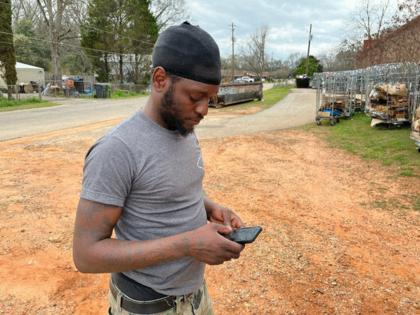
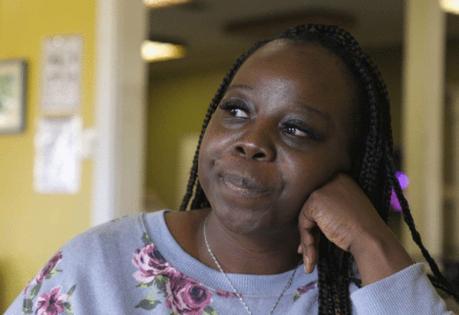
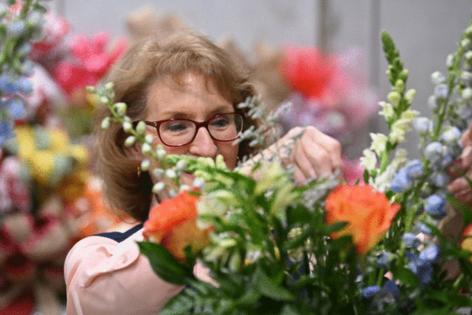
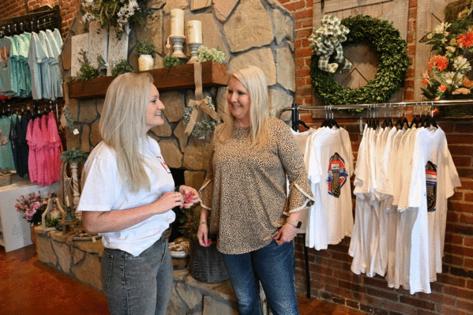
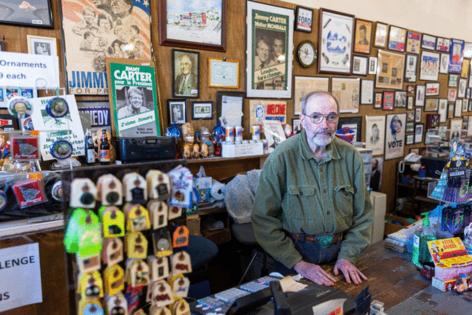











Comments